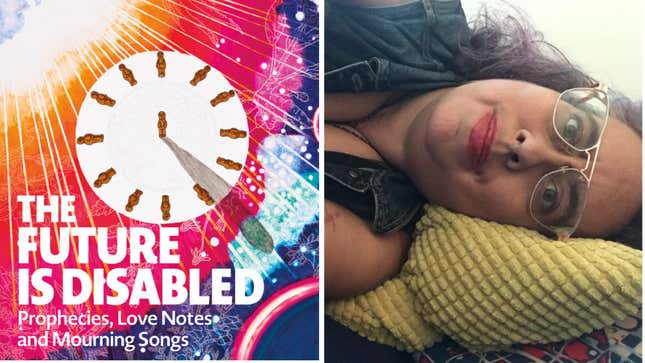‘The Future Is Disabled’ Envisions a World Where Disabled People Aren’t a Begrudging Afterthought
“I refuse to participate in our own erasure,” queer disabled author Leah Lakshmi Piepzna-Samarasinha tells Jezebel about their new book.
BooksEntertainment

Some people are clinging to a particular insistence that everything is back to normal. Whether fueled by grief, denial, or both, they want to leave the pandemic in the past. But this “global mass destabilizing event,” as queer disabled femme writer Leah Lakshmi Piepzna-Samarasinha (she/they) calls it, immersed us in a “disabled reality” that many weren’t—and still aren’t—equipped to recognize, let alone handle. And with the climate crisis ever-looming, Piepzna-Samarasinha believes that we are increasingly headed towards a “disabled future” where disabled people are not only the majority, but a “source of possibility and power” for everyone.
Piepzna-Samarasinha’s new book, The Future Is Disabled: Prophecies, Love Notes, and Mourning Songs, is a raw and urgent follow up to their 2018 book Care Work: Dreaming Disability Justice. Tackling topics of mutual aid, sustained care, and disability activism, Piepzna-Samarasinha wrote The Future Is Disabled in the midst of immense grief—most notably, after the loss of two dear friends, Stacey Park Milbern and Lucia Leandro Gimeno, who passed away during the pandemic. Interspersed between essays about how we can envision a world that values disabled life more than disdains it are recipes for crying eyes, anecdotes about “crip care,” and lists of questions you can ask yourself for “disability justice art dreaming.” In its entirety, The Future Is Disabled dares disabled folks to exist outside the bounds set by our ableist society by using disability justice to survive and combat “climate change, the rise of white fascism and white supremacy, and unending pandemics.”
“I refuse to participate in our own erasure,” Piepzna-Samarasinha told Jezebel, “and I think that one way, as disabled people, we honor each other not just by remembering each other on a personal level, but by actively archiving.”
What many of those outside of disabled communities don’t realize is that a lot of the practices they adopted in the pandemic have been part and parcel to disabled survival. “It was disabled people who first understood that viral load […] is a factor in whether one might get covid,” Piepzna-Samarasinha reminds us in the book. And then there’s masking, the technology that immunocompromised people have been using to keep themselves safe while out and about, long before we ever heard of coronavirus. Yet, the general able-bodied public still felt largely resistant to these practices, especially knowing that they came from disabled people—those who are perceived to be receivers of care, not bestowers.
-

-

-

-

-

-

-

-

-

-

-

-

-

-

-

-

-

-

-

-

-

-

-

-

-

-

-

-

-

-

-

-

-

-

-

-

-

-

-

-








































